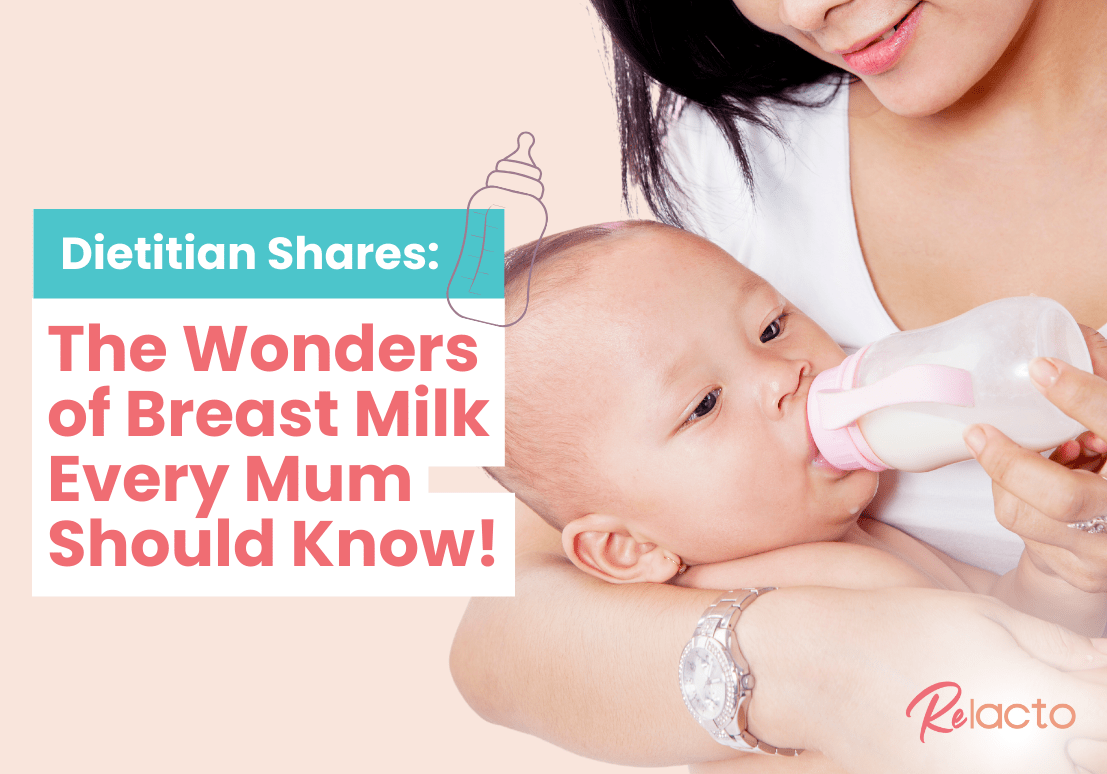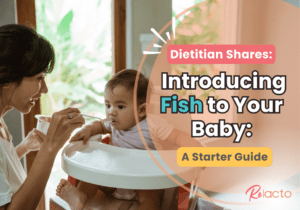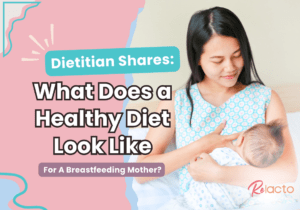Dietitian Shares: The Wonders of Breast Milk Every Mum Should Know!

The World Health Organisation (WHO) recommends exclusive breastfeeding for 6 months alongside other food and drinks until the child turns at least 2 years old.
The benefits to both mummies and babies are multifold! For women, low breastfeeding rates are associated with an increase in breast and reproductive cancers, heart disease, diabetes, weight gain and postpartum depression. Babies obtain milk, the composition of which changes throughout the day, night, months, and years to meet the child’s evolving needs as they grow.
Inevitably, understanding the science behind human milk may help mothers deepen their confidence and connection with themselves, their baby, their body, and their choice to breastfeed.
So, here are some golden nuggets of breast milk you and your partner should know.
Lactoferrin
Lactoferrin is a type of protein with anti-cancer effects, which some say helps lower the risk of developing leukaemia. It is also known to be anti-inflammatory, antibacterial and antiviral.
It also helps your little one to absorb iron more efficiently by binding to iron in their body and prevents it from being accessed by harmful bacteria that need iron to survive.
Hormones
Oxytocin is the hormone that causes feelings of relaxation and connection between mother and child. During nursing, it also helps to stimulate the let down of milk in the breast upon suckling from the baby. Simultaneously, this same hormone helps the uterus to shrink and stop bleeding after giving birth. It stimulates the uterus to contract during feeds and up to 20 minutes after the feed, thus quickening the recovery process to a pre-pregnancy state.
There is also a hormone called leptin that helps the baby feel full. This hormone helps to regulate satiety to prevent your baby from becoming overweight. This characteristic is one of the reasons why babies who are fed with infant formula milk may have a higher risk of becoming overweight in later infancy as compared to breastfed babies.
Human Oligosaccharides (HMO)
Human milk is a group of complex sugars that help the baby’s body properly develop the gut environment. There are over 100 different HMOs identified in human milk so far, and they are not digested by the baby but by the bacteria in the baby’s tummy. These beneficial bacteria then help your baby resist infection and support the immune system to develop well.
It is also researched and understood that HMOs reduce the risk of diarrheal diseases and necrotising enterocolitis, which affects the tissues of the gut to become inflamed and start to die. HMOs seem to be protective in this way.
The variety and concentration of these HMOs differ in every mother’s milk as it depends on several factors such as genetics, age of nursing, how many children the mother has had and even the season of the year!
Infant formula milk has provided some strains of HMOs into their product to replicate some of the benefits of HMOS artificially. Nevertheless, replicating a similar amount of variety and concentration is still extremely difficult in current times.
Antibacterial and Antiviral
Your body is able to identify the bacteria or virus from your baby’s body and environment and deliver specific antibodies to fight it. This response protects your baby against infection. Besides that, breast milk also contains antibacterial and antiviral enzymes, which increase in concentration as babies grow older. This helps to support the development of the baby’s immune system.
This characteristic of breast milk is probably one of the most difficult to replicate artificially. Infant powdered milk these days may have been able to be formulated to follow the nutritional profile of breast milk and provide some types of HMOs to a certain extent. However, how the body constantly makes specific antibodies and changes throughout the days and weeks is still unmatched.

Summary
The saying is true. Breast milk is truly liquid gold.
Therefore, mummies need to have balanced meals or lactation food in Singapore during this time to support both mummy and baby nutritionally. It’s not only about picking the specific best foods to boost lactation. Instead, it is more about ensuring you eat a balanced diet regularly. The “healthy plate” method is an easy way to help you visualise easily at every meal of the staple, lean proteins and vegetables you need to have to achieve a balanced diet. It typically consists of a quarter of grains, a quarter of lean proteins and the remaining half of the plate filled with vegetables of your choice. Remember, a healthy and well-nourished mother will be able to attend and breastfeed her baby better.







